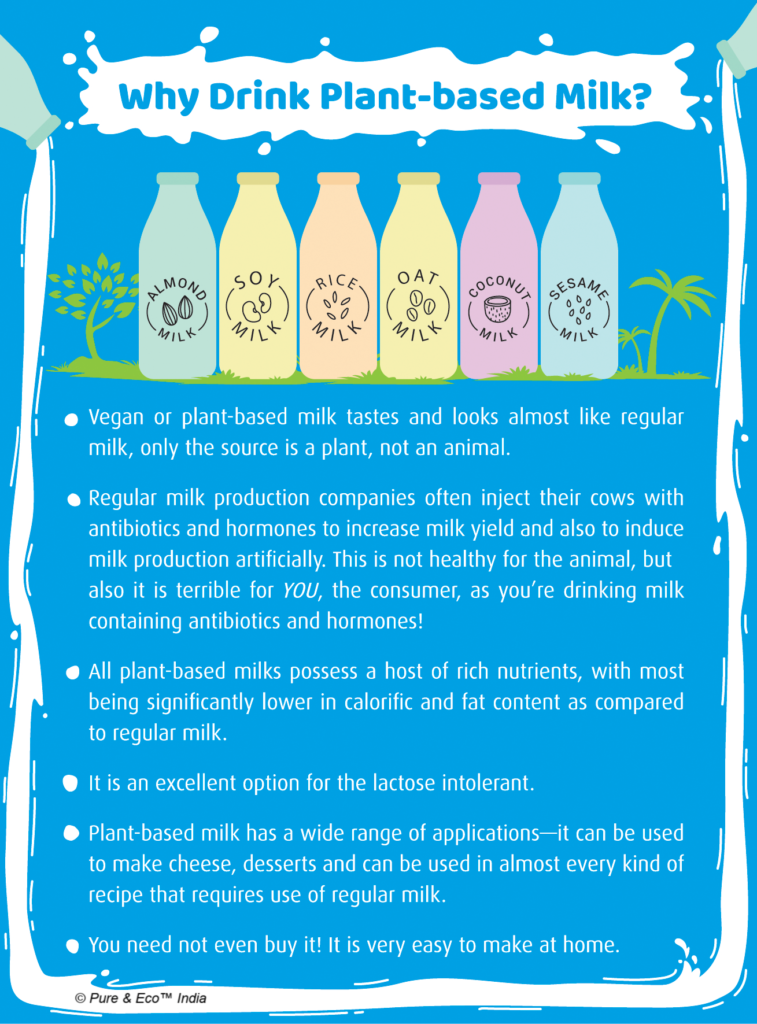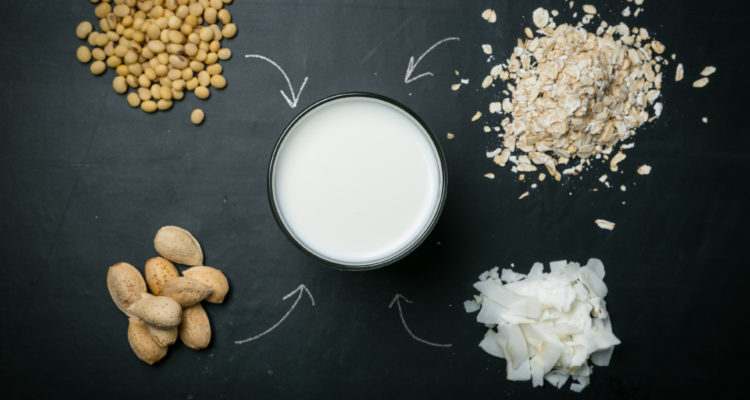◊ By Radhika Rao
Visit ORGANIC SHOP by Pure & Eco India
Human beings and their relationship with food has evolved over the decades. People are becoming more aware of the impact of their food choices, and are increasingly questioning them. Furthermore, the industrialisation of animal agriculture has been frequently criticised for its negative ethical, environmental, and social impact. The animals used for milk production are treated like units in a factory, instead of the sentient beings that they are.
NEGATIVES OF ANIMAL-BASED MILK
The majority of our population depends on milk for nourishment. It has long been touted as a rich source of calcium, protein, and other vital nutrients, but there are numerous challenges associated with it. Antibiotics and hormones are pumped into animals to increase and induce milk production, and milk is also prolifically being adulterated with detergent, caustic soda, white paint, and other harmful substances. Moreover, with 70-80% of our population being lactose intolerant*, we need to find a healthier way to nourish ourselves.
WHY PLANT-BASED MILKS ARE A BETTER OPTION
Eliminating the negatives that come with animal-based milk, plant-based or vegan† milks are derived from cereals, nuts, legumes and other plants. These alternate milk varieties are receiving increasing attention from health-conscious consumers who are looking for a more natural,
healthy, humane and yet nutritionally rich lifestyle. With growing consumer awareness, increasing market share, and continuous innovation, plant-based milks are poised to create a major storm in the dairy industry.
Some plant-based milks also offer unique health promoting components. Oat milk contains beta-glucan, which is well studied for its cholesterol-reducing properties. And soy milk contains higher amounts of antioxidants compared to animal milk. Plant-based milk companies are also fortifying their milks with nutrients like calcium in order to provide consumers with wholesome nourishment.
Plant-based milk can be made from various sources. While soy milk has been the most popular plant-based milk so far, a wide range of other milks have been studied to substitute dairy. Different kinds of nut-based milks like almond and hazelnut; cereal-based milks such as rice and oats; coconut milk, and more, are being appreciated.

INCREASING POPULARITY OF VEGAN MILKS
These milks are so convenient to make, they can be prepared by anyone at home! For instance, nut-based milks like cashew and almond milk can be made by simply soaking nuts overnight in water, and combining water and the nuts in a blender the next day. Even coconut milk can be made by blending coconut and hot water together, and allowing it to rest. By using these simple methods, people can easily create plant-based milks themselves.
Alternatively, supermarkets are brimming with vegan milk options. Numerous companies have come up in India (such as Nutriva and Goodmylk, amongst others) to cater to the rising demand for plant-based milk and dairy products. These companies have even started mixing different kinds of plant-based milks, to achieve affordable, delicious and nutritious milk, with a taste very similar to that of animal derived milk.
Plant-based milks are also being widely used as a functional replacement for use in bakery products and specialty beverages. There is a variety of plant-based milks available, each with its own suite of special attributes. Different kinds of milk are available for almost every kind of recipe. For example, almond milk has a slightly sweet flavour and creamy texture, so it works very well with desserts. Soy milk remains stable at high temperatures, so it’s great for savoury dishes.
In our increasingly health-conscious, pro-environment world, consumers are increasingly seeking out more sustainable, healthy and humane products. In 2018, data released by the global market research and data firm, Nielsen, and commissioned by the Plant Based Foods Association, revealed that in USA, plant-based milk sales have shot up by 9%, whereas conventional or animal-based milk sales are down by 6%.
In India also, plant-based milks, which are rapidly gaining popularity, will continue their ascent and are here to stay!
*A study conducted by researchers at the Sanjay Gandhi Postgraduate Institute of Medical Sciences, Lucknow, in 2015, revealed 74% Indians to be lactose intolerant.
†For the uninitiated, vegan is not the same as vegetarian. Whereas vegetarian foods are those that do not contain animal-derived meat and eggs, vegan foods are those that don’t contain any animal-derived product at all—including animal derived milk and byproducts.
ABOUT THE AUTHOR

The author is Campaign Manager for Institutional Meat Reduction,
Humane Society International, India



Thank you for sharing such an informative post on the benefit of plant-based milk and it’s important, surely will try learning from this blog in my future.